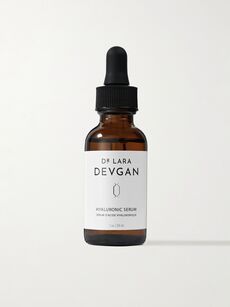Why It’s Important To Get Your Night-Time Skincare Routine Right
When it comes to getting your beauty sleep, the right evening skincare regimen can visibly upgrade your skin health, texture and tone. Here, celebrity facialist ADEELA CROWN explains exactly what you need to use to achieve your best complexion come morning
“I always tell my clients that you must do the skin homework at night to get the best glowing grades during the day,” says A-list facialist Adeela Crown. “Not only are many products designed to work more effectively at night, but it’s also when your skin removes lymph fluid, repairs itself and reverses oxidative DNA damage done during the day. Plus, when your body is at rest, your stress levels are low and your microcirculation, oxygen saturation and skin permeability are at their optimum, so the nutrients in creams and serums are better absorbed.” With all that in mind, Crown shares the ultimate PM skincare routine to follow to get the most from your evening beauty arsenal.
Cleanse for your skin type
While a double-cleanse is often deemed essential in the evening, Crown advises considering what your skin really needs. “Double-cleansing isn’t for everyone and may aggravate certain skin types, like dehydrated skin, as it may strip the skin of moisture and make it drier, flakier and duller.” Look to creamy foaming formulas, which will do the job of two cleansers while still keeping skin in balance. “If you do double-cleanse, follow an oil or balm cleanser with a soap-free cleanser – this is great for daily-makeup wearers who also want a deep pore purge to remove sunscreen. I wouldn’t recommend using an oil or balm for sufferers of acne or rosacea, though – you’d be better off with a good medicated, soap-free cleanser that neutralizes and soothes in one go.”
Consider a toner
“Toner formulations have come a long way – and phytobotanical, fermented formulations, like Vintner’s Daughter’s Active Treatment Essence, do more than simply tone,” says Crown. “It hydrates, refines and feeds the skin with a broth of carefully balanced, multi-beneficial skin nutrition without compromising the skin’s natural barrier.”
Cocktail your serums
“I love to marinate my skin overnight with a mix of serums,” says Crown. While layering can cause pilling of the product layers underneath each one, cocktailing – mixing serums before you apply them to your skin – prevents these issues, according to Crown. “Don’t mix oil with water and don’t combine actives that strip the skin’s barrier, like retinol mixed with AHAs. Use a base of a hyaluronic-acid serum blended with a targeted serum to address a certain issue, such as peptides for fine lines, ceramides for dryness, or niacinamide to sweep away any morning-related pollution, plus makeup congestion and inflammation.”
 DR LARA DEVGANHyaluronic Serum, 30ml
DR LARA DEVGANHyaluronic Serum, 30ml
Hydrate with an overnight mask
“On top of the serum marinade, I always prefer to use a sleep mask over a moisturizer, as it offers a step-up in terms of nourishment,” says Crown. “I’m a huge fan of the La Prairie Luxe Caviar Sleep Mask, which I alternate with Sisley’s Black Rose or Velvet Sleeping mask. Dedicated night creams are great for creating a seal that locks in the serum’s hydration, too.”
Exfoliate on alternate nights
“Twice a week, I blend a few drops of a low- to mid-strength acid with my sleep mask to wake up with resurfaced skin. It’s like getting a facial while you sleep. Dry skin will benefit from glycolic acid, whereas lactic acid is ideal if you have sensitive skin. For pigmented complexions, use mandelic acid, or opt for salicylic acid if you’re prone to blemishes. Blend the mask with your chosen acid in your palm, or in a bowl with a brush, then apply it as you normally would a leave-on mask.
 SARAH CHAPMANOvernight Exfoliating Booster, 30ml
SARAH CHAPMANOvernight Exfoliating Booster, 30ml
Skin-cycle your retinol
If you normally use a retinol at night, Crown advises applying it on alternate evenings (in lieu of the exfoliating mask above) and adding a layer of hydration before your serum cocktail and after your sleep mask to minimize dryness and flaking. “On your retinol-off nights, give your skin some love and hydration, as it will be more moisture-needy than usual. A good layer of Vintner’s Daughter Active Botanical Serum will be a welcome nourishing blanket. Plus, it’s super-rich in natural botanical antioxidants that, when used at night as a second helping (a daytime antioxidant shield is key), will mop up the damaging free radicals to ensure you wake up with renewed, radiant skin.”
Make time for massage
“If everyone took two to five minutes for a facial massage just three times a week, I’d have half as many clients – they’d all have great skin! It’s because massage is such a great way to bring your skincare to life, whether you’re using a face oil, cream, or even a cleanser, which should be massaged in for at least 60 seconds to cleanse properly. It also leads to better microcirculation for boosted product absorption, and, if done with purpose, can help with lymphatic drainage, muscle tone and contouring, too.”
Don’t forget your eyes
“The skin around the eyes ages faster than the rest of your face, with the outermost layer of the skin averaging just three layers thick, compared to the 15-plus layers on other areas of the body. Plus, with no oil-producing sebaceous glands, the skin in this area is highly susceptible to dryness and sagging. Formulas containing stem cells, peptides or hyaluronic acid are a great way to offer gentle but visible results.”
RELATED READING
The model featured in this story is not associated with NET-A-PORTER and does not endorse it or the products shown

